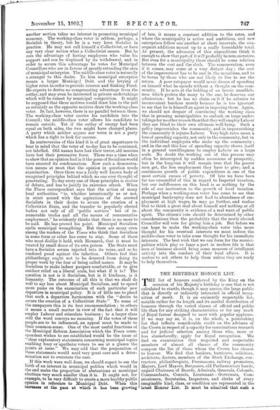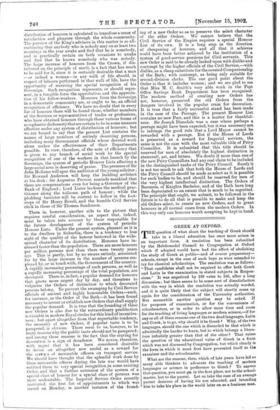THE BIRTHDAY HONOUR LIST. T HE list of honours conferred by
the King on the occasion of his Majesty's birthday is one that is not calculated to startle, though it may amuse, the large public that is directly or indirectly interested in official recog- nition of merit. It is an eminently respectable list, notable rather for its length and its careful distribution of honours through the varied classes of official and public life than for any striking characteristics or for any mark of Royal favour designed to meet with popular applause. If we may say so, it is, on the whole, a painstaking list that reflects considerable credit on the advisers of the Crown in respect of a capacity for conscientious research and for judicial selection among those who, more or less shamefacedly, apply for Royal recognition. We find on examination that respected and respectable members of almost all classes of the community compose the list of those whom the Crown has chosen to honour. We find that bankers, barristers, solicitors, architects, doctors, members of the Stock Exchange, con- tractors, philanthropists, Freemasons, railway promoters, Mayors, Lord Mayors, Burgesses, old Parliamentary hands, unpaid Chairmen of Boards, Admirals, Generals, Colonels, Commandants, Consuls, Lieutenant - Governors, Com- missioners, Secretaries, Inspectors, and clerks of every imaginable kind, class, or condition are represented in the latest Honour List. It must be admitted that such a distribution of honours is calculated to transfuse a sense of satisfaction and pleasure through the whole community.
The purview of the King's advisers in this matter is so all- embracing that anybody who is nobody may on at least two mornings in the year awake and find that he is somebody, and is practically certain on both occasions to awake and find that he knows somebody who was nobody. The large increase of honours from the Crown, if dis- tributed on the principle of merit, is a fact that has much to be said for it, since it is certainly desirable that a man —or indeed a woman—in any walk of life should, in respect of labours performed in that walk of life, have the opportunity of receiving the special recognition of his Sovereign. Such recognition represents, or should repre- sent, in a tangible form the approbation and the apprecia- tion of his fellow-workers. Honours from the Sovereign in a democratic community are, or ought to be, an official recognition of efficiency. We have no doubt that in every list of honours there will be found those, whether members of the Services or representatives of trades or professions, who have obtained honours through those various forms of sycophantic dishonesty that arecertain to be in some measure effective under any system of distribution of honours ; but we are bound to say that the present List contains the names of large numbers of entirely deserving persons, including many Government officials whose devoted work alone makes the effectiveness of their Departments possible. In view, therefore, of the note of efficiency that is given to any branch of social work by the special recognition of one of the workers in that branch by the Sovereign, the system of periodic Honour Lists affecting a large social area is deserving of praise. The presence of Sir John Hollams will spur the ambition of the young solicitor; Sir Rowand Anderson will keep the budding architect at his desk ; Sir Augustus Prevost reminds mankind that there are compensations even for being a Governor of the Bank of England ; Lord Lister beckons the medical prac- titioner along the toilsome path of honour ; while the plodding barrister will be content to follow in the foot- steps of Sir Henry Bovell, and the humble Civil Service clerk in those of Sir Thomas Sanderson.
There is, however, another side to the picture that requires careful consideration, an aspect that, indeed, must be taken into account by those responsible for the future development of the system of periodic Honour Lists. Under the present system, pleasant as it is to the dwellers in Suburbia, there is a tendency to lose sight of the quality of the honour bestowed in the wide- spread character of its distribution. Honours have in- creased faster than the population. There are more honours per million persons now than there were twenty years ago. This is partly, but by no means entirely, accounted for by the large increase in the number of persons em- ployed by, or in touch with, the Government of the country. A rapidly increasing percentage of such persons, as well as a rapidly increasing percentage of the total population, are decorated. There is, in fact, a popular demand for honours that grows more urgent day by day, and threatens to vulgarise the Orders of distinction to which decorated persons belong. To prevent the swamping by Civil Service officials of ancient and highly honourable Orders—such, for instance, as the Order of the Bath—it has been found necessary to invent or establish new Orders that shall supply the popular demand. It is true that the founding of these new Orders is also due to the extraordinary predilection noticeable in modern Royal circles for this kind of inventive- ness; but apart altogether from that regrettable tendency, the necessity of new Orders, if popular taste is to be pampered, is obvious. There seem to us, however, to be many reasons why the public taste should not be pampered; and among these reasons is the fact that the craving for decoration is a sign of decadence. We notice, therefore, with regret that it has been considered desirable to devise an altogether new medal as a reward for the berv:ws of mercantile officers on transport service. We should have thought that the splendid work done by these mercantile officers during the late war would have entitled them to very special recognition.in some existing Order, and that a further extension of the system of a special class of honour for a special class of persons was most undesirable. The Imperial Service Order recently instituted, the first list of appointments to which was issued on Monday, is another instance of the found- ing of a new Order so as to preserve the select character of the elder Orders. We cannot believe that the Civil Service of the Empire requires a special Honour List of its own. It is a long step in the direction of cheapening of honours, and all that it achieves could have been better achieved by the institution of a system of good-service pensions for Civil servants. This new Order is said to be already looked upon with dislike and contempt by the higher officials of the Civil Service,—with dislike, as a cheap substitute for the coveted Companionship of the Bath ; with contempt, as being only suitable for second-division clerks. The one good point about the Order is that it includes women ; and we are glad to see that Miss M. C. Smith's very able work in the Post Office Savings Bank Department has been recognised. The modern method of creating new Orders has not, however, preserved the old Orders from the dangers involved in the popular craze for decoration.• It is true that a fairly successful stand has been made in the case of the Peerage. The present Honour List contains no new Peer, and this is a matter for thankful-. ness. Sir Joseph Dimsdale was a case where perhaps a peerage might have been expected, but it was necessary not to infringe the good rule that a Lord Mayor cannot -be rewarded with a peerage. But if the House of Lords is preserved as a reward for Imperial services, the same is not the case with the most valuable title of Privy Councillor. It is submitted that this title should be reserved for men of absolutely the highest distinction in statecraft, art, and letters. We doubt if more than one of the new Privy Councillors had any real claim to be included in the distinguished ranks of the Privy Council. Surely it is not too much to ask that both the House of Lords and the Privy Council should be made as select as it is possible for such bodies to be, and should be reserved for men of the very highest intellectual distinction. The Orders of Baronets, of Knights Bachelor, and of the Bath have long been depreciated to an extent that is much to be regretted. The principle that ought, we submit, to be followed in the future is to do all that is possible to make and keep the old Orders select, to create no new Orders, and to grant honours in all normal cases from the modern Orders. In this way only can honours worth accepting be kept in hand.























































 Previous page
Previous page